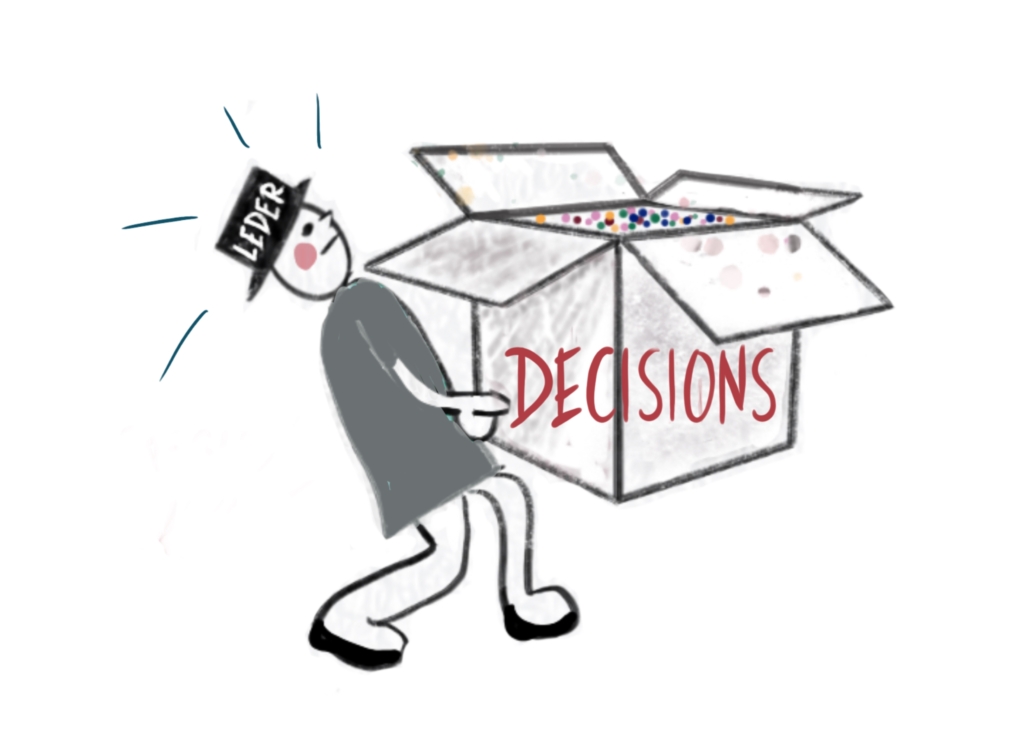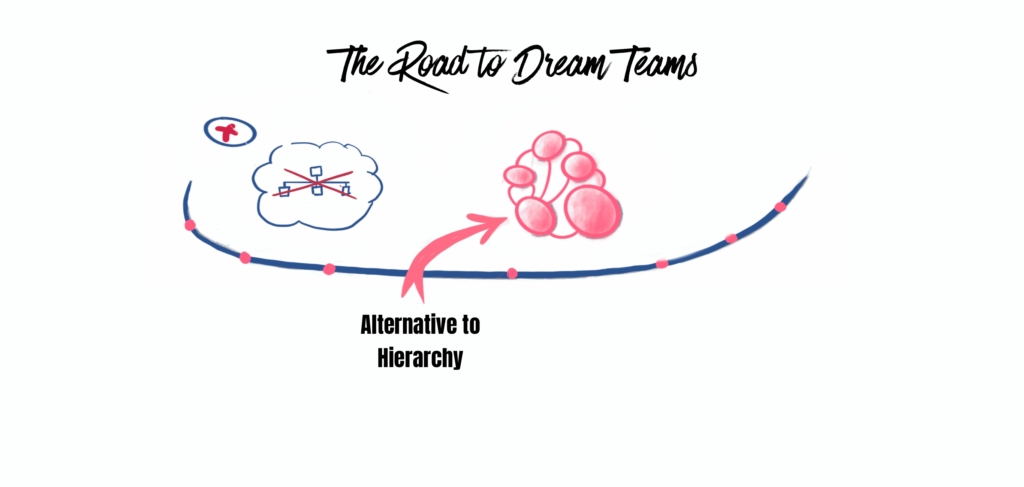1(3) “WE’LL START BY FIRING OURSELVES, Leise”
He was the CIO and my manager
Did he actually just fire me?
This is a true story about how to form self-managing teams
By Leise Passer Jensen, Agilit May-20 2023
.
“We’ll start by firing ourselves, Leise”
I felt the chill running down my spine.
Why would we do that?
- I had never been fired
- I loved the privileges of being someone else’s leader
- I could feel the anxiety building up in my body and mind
But – why only say it to me?
What about the rest of the management team?
“I need your help to redesign our organization,” my manager said.
“We can’t come up with something new while sitting comfortably in our executive chairs.
We both have to be title-less to think out of the box.”
“Well, okay – that way. I see.”
I anxiously waited for the resignation letter for a few days. It never came 🤪.
So it was obviously not that way.
Of course, I felt a bit released and it eased my anxiety and uncertainty.
In a way, it was kind of cool that I was the boss’s trusted middle manager and represented the others in our management team. The issue was, however, that the others didn’t know anything about it – I’ll come back to that.
The two of us felt proud of the result
I was proud of the outcome of the new organisational design that I had been deeply involved in:
- A leaner organisation
- More efficient
- No layoffs
At least, that’s how the two of us thought.
Those of us who had done the thinking.
But what about the others?
The leadership team and the employees didn’t quite share our enthusiasm.
Because they hadn’t been involved. They were disengaged.
But we quickly got back to normal work days, as the trimming seemed okay to them after all.
We had fewer complaints; more quality deliveries and delivery times were halved. Our leader had some individual 1:1s with my colleagues, I remember. It didn’t really go that smoothly.
The employees were a bit indifferent
Everyone just continued to work together in their informal relationships and circles as they had always done.
You know what I mean?
THIS HAPPENED TO ME IN REAL LIFE
My manager was 25 years ahead of his time.
Somehow. Without knowing.
.
But…
Hang on…
His ideas weren’t enough to create happier teams.
Something was clearly missing from the process.
But what?
Let’s imagine how we would do such a reorganization in the future
What follows is also a true story.
⏰
Fast forward 25 years
⏰
Imagine the same type of manager and the same type of management team. They had started to call themselves ‘leaders’ and ‘leadership team’ although it was only by name.
“WE START BY FIRING OURSELVES”
– said the manager.
He conveyed it to everyone in the leadership team.
👻 👻 👻 👻 👻 👻 👻 👻
Everyone felt nervous.
👻 👻 👻 👻 👻 👻 👻 👻
They were fired the next day. Collectively. At the leadership team meeting. But – not really.
They were terrified.
“You are all guaranteed a job,” said the leader. Let’s call him Paul.
Their mood improved a little.
“I hope that all of you will all join me in an experiment to introduce self-managing teams. Without layers of middle management.“
No middle management?
The negativity spread again in the leadership team.
Bugger, bugger, bugger!
This wasn’t the job they had been hired for, right?.
But nobody said anything.
Paul broke the silence:
“I have thought a lot about the rationale behind why you guyz have to ask me to take so many of the important decisions.

Both you and our colleagues are much better than me at making most decisions. But it would require guidelines for making decisions and other stuff. And everyone would have to be educated in them.
I would like us to make those new guidelines. Together.
.
Not that many of our colleagues are happy about working here.
– All our data back it up
– I would like us to try and change that
– Going to work should be fun – not only for people in leading positions
.
Paul proposed the following plan:
– We need everyone to be involved during this new initiative
– We invite volunteers to join a coordinator group
– Participation in preparations will be voluntary
.
It is an experiment:
If we can’t get at least 80% of our colleagues to join the experiment, it will stop.
I suggest we give it 6 months.
Well, what do you say?”
.
The atmosphere had improved a little.
This was the last time Paul used his managerial power to introduce a radical change.
The (former?) leadership team discussed the fact that the initiative required certain preconditions to be successful.
Emotions ran high.
Paul had already mentioned the first prerequisites:
- Opt-in participation
- Trust
- Transparency
- Commitment
- We know our Purpose in everything we do
One of the leaders (hm… former leaders?) grumped:
“Boss, you say that everything will be voluntary. Does that mean there won’t be negative consequences if opt out of all this?
I don’t believe it until I see it.”
The words were Gary’s.
.
“Correct,” said Paul. “But we need at least 80% to commit to the idea of introducing self-managing teams. We need to find a solution for the possible max. 20% who prefer the status quo.
Of course, this will be difficult or at times impossible.
But I know that there are companies out there that have introduced self-managing teams voluntarily. It’s actually not my idea. We will learn from their experience.”
Mia from the now former leadership team said:
“I am in favour of the 4 principles of volunteering, trust, transparency and commitment. Let’s give it a try. But…
One important precondition is missing.
Perhaps the most important one.”
“Agreed,” said Paul. “And 2 universal principles must also be added. We already know our Company Purpose. But first, I’m curious to hear what you have in mind, Mia?”
“Security,” Mia said. “As in Psychological Safety.
We never gain anyone’s trust without them feeling safe. Feeling confident that the changes won’t lead to redundancies.
Confident that when we say we’re going to involve everyone, we’ll put our money where our mouth is and keep our promises.”
“Agreed,” said Paul. “That is the first of 2 universal principles we’re introducing:
Everyone does what is agreed.
No one can force another human being to do something against his/her will.
.
Paul suggested they adjourned the meeting. It was a big mouthful for them all to swallow.
They agreed to sleep on what Paul had said and meet the next morning to talk further.
They spent the next few days discussing the situation over and over again. Openly and honestly they discussed the pros, cons and concerns of the changes.
It seemed somehow obvious that the effect would not only be to accomodate Paul’s desire to delegate decisions.
Finally the time had come to communicate to all their colleagues.
“We must remember to convey openly and honestly that we don’t have the answers to everything.
That we need to experiment together, make mistakes and learn from them,” said Paul.
.
“Hm… we are leaders and must not make mistakes,” said Gary.
.
Paul: “In the future, mistakes are allowed and welcomed. None of us are expected to be infallible.
Now everyone has to learn to show leadership. Leadership is no longer reserved those of you who used to sit on the pedestal of a leadership team.
From now on we are all leaders
We will organise ourselves differently – in self-managing teams.
When everyone does what we promise, we don’t need anyone to check that things get done.”
“I’ll make the necessary decisions along the way,” Paul continued, “but it will be at a much higher level of detail than before.
Over time, that will also disappear when we have replaced it with something else.
But one thing is certain – the hierarchy and middle management layers are gone. At least for the next 6 months.
The universal principle 2 (no one can decide over others against their will) will be challenging because we no longer have any middle managers with power over ‘their’ employees.
Conversely, it will no longer be possible for colleagues to abdicate responsibility on the pretext that “it’s the managers’ responsibility – I don’t care”.
At the end of the day, we will have Dream Teams
As long as we remember to take micro seps.

NEXT STEPS
We need to form new teams, and our employees, or colleagues, must be involved in this – voluntarily embarking to a facilitated process.
I’ll ask someone with experience in the process called ‘Self-selecting Teams‘ to help with the facilitation. Nowadays thousands of teams have done that successfully before us.”
.
“Let me summarise”, Paul concluded.
“We must work on fulfilling the following prerequisites in the future. More will come, I’m sure.
.
PREREQUISITES FOR OUR FUTURE ORGANISATION
- Opt-in participation in any initiative
- Purpose in everything we do
- Trust and confidence – always
- Security
- Commitment and Transparency:
– Towards oneself
– Towards our colleagues
– Towards the coordinators’ group of this new initiative
– Towards the Executive Board and the Board of Directors
.
And we have
2 UNIVERSAL PRINCIPLES:
Everyone does what has been agreed
No one can force another person to do something against his/her will
.
It all sounded fine so far, the group agreed.
Except for one who felt it all to be a bit scary. That was Gary.
.
What they didn’t realise was that it was only now that the hard work began.
And that it was going to be much harder than Paul had expected.
.
– Would they revert to the familiar hierarchy when they ran into problems?
– Not everyone was equally enthusiastic about the new situation
– Would they eventually succeed in creating happier teams?
– Some of those in leadership roles felt threatened
.
You can read more about this and much more in my upcoming newsletters.
Thank you for reading along.
.
Regards,
Leise Passer Jensen
.
PS!
The last part of this ‘essay’ is also based on a true story. I’ll tell you more about that in my next newsletter.
If you liked this, I would be delighted if you would share the news about my brand new newsletter in your network.
You can share this link: https://agilit.dk/newsletter-sign-me-up/
Sources and where to read more
Sources: The No Limit Enterprise by Doug Kirkpatrick



